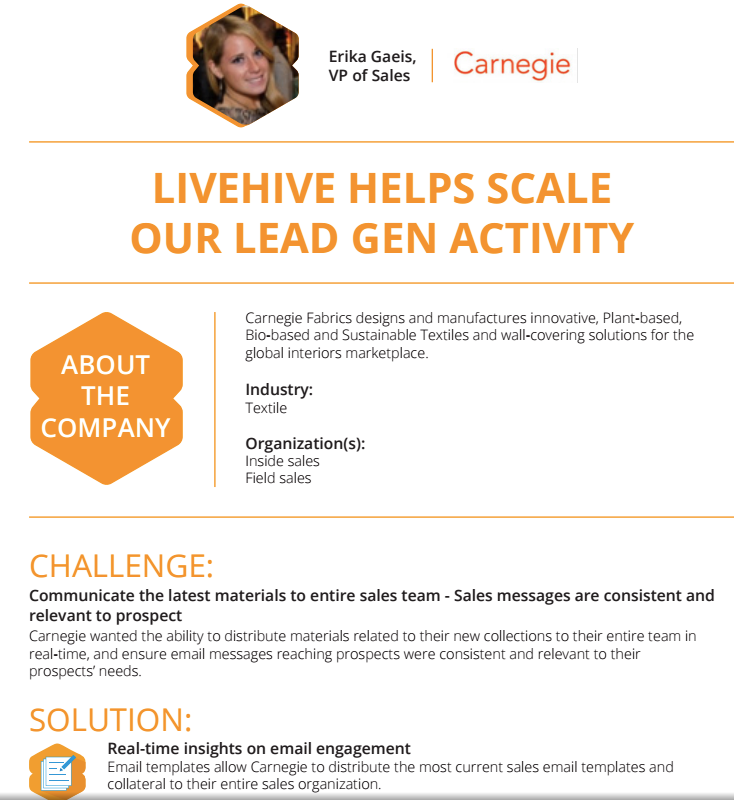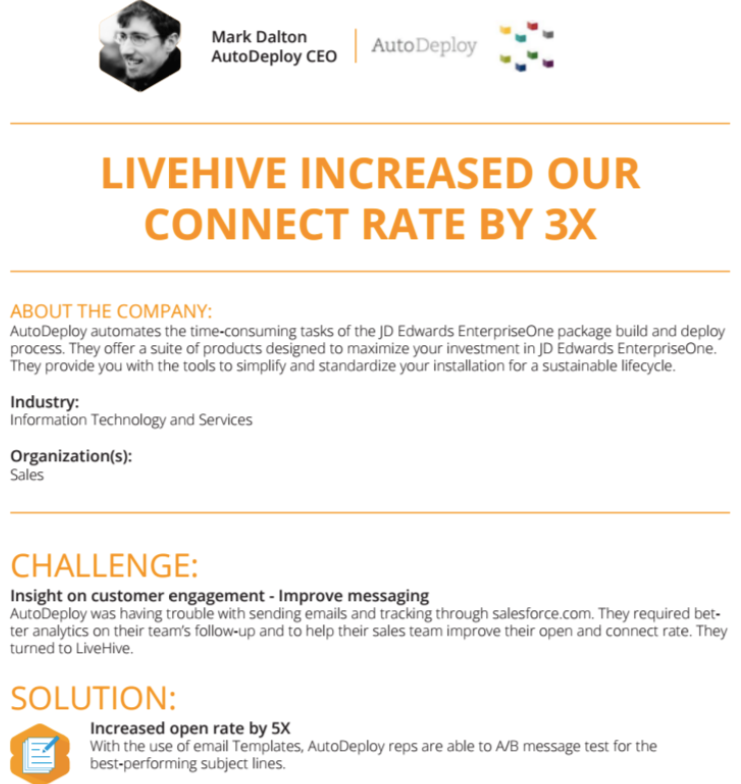Ninety-five percent of buyers choose vendors that provide ample content to navigate the buying process – and two-thirds of today’s buyers rely more on content for their purchasing decisions than a year ago. However, out of those, nearly 75% of them say they have less time to view it!
As marketers, we get the fundamentals. Content needs to deliver relevant and interesting information to your audience. Content should address their key pain points. Content should be clear and well written. Content should position your company as a knowledgeable and trusted advisor.
However, on top of those requirements, there are other, less obvious criteria that make your content significantly more valuable for sales organizations and, hence, your customers, including:
- The type of content
- Ease of accessibility
- Personalized messaging
Produce content buyers want
Almost three-quarters of buyers don’t have the time to read your content! This means that the type of content you give to sales has to be exactly what buyers are looking for; presented in an easily digestible format; and include a value prop that interests them.
First, start by looking at the different kinds of collateral. What kinds of collateral resonate most with buyers? Here are some examples:
- Customer case studies
- Industry articles
- White papers
- Videos
For short-form sales content, case studies or executive summaries can pack a powerful punch on just a single page. By using subheads and bullets to highlight the business challenges and solutions, you can convey key messages quickly and in a highly readable way. With a blend of creative and ‘bite-size’ content, eBooks are another type of popular short form sales content.
For the times when your audience wants more in-depth analysis, you’re typically looking at a white paper. However, if you’re producing a white paper or another form of long content, don’t confuse length with complexity. You want content –short or long – to be easily understandable to the reader. Language should be simple; sources should be clearly identified, and formatting should be visually pleasing.
With case studies, break out copy in sections to highlight the customer challenge and the value proposition delivered with your solution.
A final word on the type of sales content – don’t fill it with fluff! The vast majority of buyers want to see research to support what you’re saying in content. Unless you’re an expert in the field (and the world knows it), substantiate your claims with research, even if it’s your own.
If you write it, it doesn’t mean they will come
We live in an on-demand society. We want what we want when we want it. And generally – thanks to Amazon and other modern-day services – we can get it!
If your sales team can’t easily get to your content – no matter how great it is – when they want it, there’s not much point in building it because no one will ever read it! If you’re creating content for sales, it must be easily accessible to them.
Imagine the scenario. A sales rep is giving a demo to a hot prospect. At the end, the prospect asks if there are any case studies showing how customers have used feature XYZ. With a vague recollection of a case study emailed to the team a few months back, the rep responds affirmatively.
Afterward, the rep goes back to his computer, spends 15 minutes doing email searches trying to find said case study, finally gives up and emails the marketing team, and then waits for them to respond. That’s not how businesses want their sales teams spending their time – not to mention the potential impact that could have on closing deals!
Sales teams need the ability to find and download your content with a single click. There are sales acceleration platforms that sit right on a sales rep’s desktop and are seamlessly integrated with cloud storage services like Box or Dropbox that make this possible.
Swap out generic with personalized content
Personalization has become a hot topic for both marketing and sales. In the Harris poll, 88% of executive buyers said that vendor outreach personalized to their company’s industry was absolutely essential. And, according to Gartner, 89% of companies plan to compete primarily on the basis of customer experience by next year.
How do you help deliver more personalized content to buyers via sales?
One option is to give up a little control of the message. Before all of you marketers reading this panic, pre-built ‘customizable’ email templates can still ensure that your topline messaging is clearly and concisely conveyed in emails. However, with a customizable format, email templates also give sales the ability to personalize messaging further as they see fit on a customer-by-customer basis.
Combined with emerging sales analytics, these types of email templates can also show which messaging was most effective through A/B testing – much like marketers get with marketing automation systems. Taking it a step further, sales engagement analytics can even show how prospects interact with attached collateral – so you can see what sales content is having the most success with prospects and tweak your messaging accordingly.
Aberdeen Group research shows that best-in-class companies are aggressively aligning marketing and sales activities around content development. These companies are providing sales reps with sales enablement platforms to enable more personalized content.
Producing content for your sales organization is more important than ever for your sales organization. But just producing content isn’t enough. Marketers need to make sure that the content works for your sales team – otherwise, it won’t help them and they won’t use it. And you’ll only be wasting your time and marketing dollars.
About the Author: Micheline Nijmeh is the CMO for LiveHive, Inc., whose award-winning sales acceleration platform provides deep buyer-based engagement analytics and automated email sequencing. A seasoned Silicon Valley executive, Nijmeh has served as Senior Director, Integrated Global Campaigns at Salesforce.com, where she led the market launch of Salesforce’s Chatter and Force platform.


Comments (1)